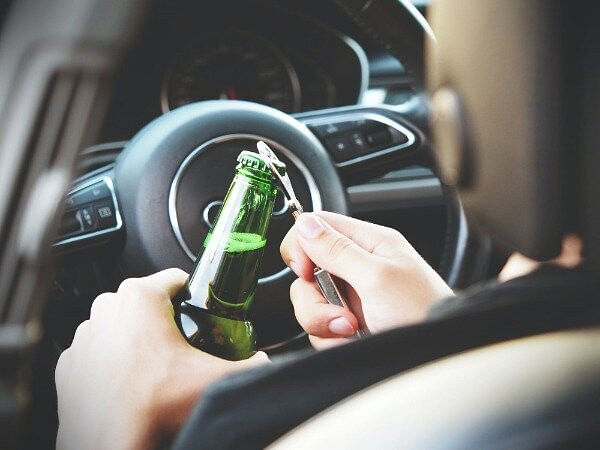
What Should I Do If I am Charged with Intoxication Assault?
A charge of intoxication assault is a serious offense involving causing bodily harm to another person while driving under the influence of alcohol or drugs. The consequences can be severe, including hefty fines, imprisonment, and a permanent criminal record that can affect various aspects of your life. Knowing what steps to take immediately after being charged is crucial for your defense and future. The goal of Denuna Law is to provide a comprehensive guide on what to do if you find yourself in this situation, helping you navigate the legal complexities and make informed decisions.

Understanding Intoxication Assault
Intoxication assault is defined as causing serious bodily injury to another person while operating a motor vehicle, aircraft, watercraft, or amusement ride under the influence of alcohol or drugs. The injury must be a direct result of the intoxicated state of the operator. This charge is more severe than a standard DUI (Driving Under the Influence) or DWI (Driving While Intoxicated) because it involves harm to another individual.
In legal terms, "serious bodily injury" means an injury that creates a substantial risk of death, causes serious permanent disfigurement, or results in long-term loss or impairment of any bodily member or organ. The prosecution must prove that the intoxication directly caused the accident and resulting injuries.
Potential Penalties
The penalties for intoxication assault can be severe and vary depending on the jurisdiction and the specifics of the case. Generally, the consequences may include significant financial penalties that can range from thousands to tens of thousands of dollars. Prison sentences can range from several years to over a decade, depending on the severity of the injuries and whether there are prior offenses.
Mandatory suspension or revocation of your driver’s license for a substantial period, and probation conditions may include regular check-ins with a probation officer, community service, and adherence to strict behavioral guidelines. Rehabilitation programs are also often made mandatory, as attendance in alcohol or drug education and rehabilitation programs typically do more to prevent recidivism. Unfortunately, a conviction can lead to a permanent mark on your criminal record, affecting future employment, housing, and other aspects of your life.
3 Immediate Steps to Take If Charged with Intoxication Assault
Being charged with intoxication assault can be a highly stressful situation, but it's crucial to stay calm and composed. Panicking or reacting impulsively can worsen the situation. Take deep breaths and focus on the immediate steps you need to take to protect your rights.
One of the most important things to remember is to exercise your right to remain silent. Do not admit guilt or make any statements to the police or anyone else without your attorney present. Anything you say can and will be used against you in court. Politely inform the officers that you wish to speak to your attorney before answering any questions.
Securing legal representation is one of the most critical steps you can take after being charged with intoxication assault. A skilled criminal defense attorney has the expertise and experience necessary to navigate the complexities of your case. They can help you understand the charges against you, develop a defense strategy, and represent you in court.

How to Choose the Right Attorney
Selecting the right attorney can significantly impact the outcome of your case, so look for an attorney who specializes in criminal defense, particularly in cases involving intoxication assault or DUI/DWI charges. Research the attorney's reputation, including reviews and testimonials from previous clients, and consider the attorney’s track record in handling similar cases. The legal defense professionals at Denuna Law communicate clearly and regularly, keeping you informed about the progress of your case.
Documenting the Incident
Gathering evidence as soon as possible after the incident is crucial for your defense. This evidence can help your attorney build a strong case. Key types of evidence include:
Photos and Videos: Take pictures or videos of the accident scene, any damage to vehicles, and any visible injuries. Documenting the conditions at the time of the incident can provide valuable context.Physical Evidence: Preserve any physical evidence related to the incident, such as damaged personal items or clothing.
Obtain copies of all relevant medical reports and police reports. These documents can provide critical information about the incident and the injuries sustained. Ensure your attorney has access to:
Medical Reports: Detailed accounts of the injuries sustained by the victim, including the severity and treatment provided.
Police Reports: The official record of the incident as documented by law enforcement, including officer observations and any citations issued.
Preparing for Court
Familiarizing yourself with the legal process will help you know what to expect and reduce anxiety. Key stages include:
1) Arraignment: The first court appearance where you will be formally charged and asked to enter a plea.
2) Hearings: Pre-trial hearings where evidence is presented, and legal motions are made.
3) Trial: The main court proceeding where both sides present their cases, and a verdict is reached.
Your attorney will work with you to develop a defense strategy tailored to your case. Potential defenses might include challenging the evidence and questioning the validity of said evidence, such as the accuracy of blood alcohol tests or the legality of the traffic stop.
The manner in which you were arrested will also be scrutinized such as arguing that law enforcement did not follow proper procedures during the arrest. Also, providing alternative explanations for the cause of the accident and injuries can help your defense case.
It is crucial to comply with all court orders and attend all scheduled hearings. Failing to do so can result in additional charges and negatively impact your case, so adhere to any conditions set by the court, such as avoiding alcohol or attending scheduled appointments. Be punctual and present at all court hearings because your presence shows the court that you are taking the charges seriously and are committed to the legal process.
By preparing thoroughly for court and working closely with your attorney, you can navigate the legal system more effectively and improve your chances of a favorable outcome.
Aftermath
The resolution of an intoxication assault case can vary based on several factors, including the strength of the evidence, the defense strategy, and the jurisdiction. Potential outcomes include:
Dismissal: If there is insufficient evidence or procedural errors, the case may be dismissed.
Plea Bargain: You may agree to plead guilty to a lesser charge in exchange for a reduced sentence.
Trial Verdict: If the case goes to trial, the jury or judge will determine your guilt or innocence. A guilty verdict can result in significant penalties, while an acquittal means you are found not guilty.
Understanding and preparing for various potential outcomes will help you and your attorney strategize effectively. If found guilty, you will face sentencing. This could include imprisonment, fines, probation, or mandatory participation in rehabilitation programs. If granted probation, you must adhere to specific conditions, such as regular check-ins with a probation officer, community service, and avoiding alcohol or drug use. You may be required to attend alcohol or drug education and rehabilitation programs to address underlying issues contributing to the offense.
An intoxication assault conviction can have long-term impacts on your life, including a permanent criminal record can affect employment opportunities, housing, and personal relationships. Certain professions may bar individuals with a criminal record, and potential employers may conduct background checks, and relationships with family and friends may be strained due to the legal issues and the stigma of a conviction.
More Forward
Recovering from an intoxication assault charge and its aftermath can be challenging. Focus on rebuilding your life by seeking professional counseling to address any underlying issues related to alcohol or drug use. Join support groups such as Alcoholics Anonymous (AA) or Narcotics Anonymous (NA) to connect with others facing similar challenges, and utilize community resources to help with employment, housing, and other aspects of rebuilding your life.
Learning from the experience and making safer choices in the future can help you avoid similar legal issues. Stay informed about the laws and consequences related to intoxication and driving, and make positive changes in your lifestyle to reduce the risk of future incidents, such as using alternative transportation options when consuming alcohol. Support systems are critical, so build a strong support system of family, friends, and professionals who can help you make better decisions and provide assistance when needed.

Denuna Law Protects Your Rights
Facing a charge of intoxication assault doesn’t mean you need to navigate this challenging time alone. At Denuna Law, we specialize in defending individuals against serious criminal charges, including intoxication assault. Our experienced team of criminal defense attorneys is committed to providing personalized, vigorous representation to protect your rights and secure the best possible outcome for your case.
Don't wait to get the help you need. Contact Denuna Law today for a free consultation and start protecting your rights.
Find out how we can fight your DWI charges. Call (713) 257-8889 or click the button below to arrange a free consultation.

You have 15 days to
save your license
If you've been arrested for a DWI in the state of Texas, you are facing two cases against you. The first one is the criminal case by the state of Texas, and the other is by the Texas Department of Public Safety to suspend your license.
Experienced DWI
Defense Lawyer
If you have a case and want an attorney who will instill fear in the prosecution and DA, call or message Chris today!


